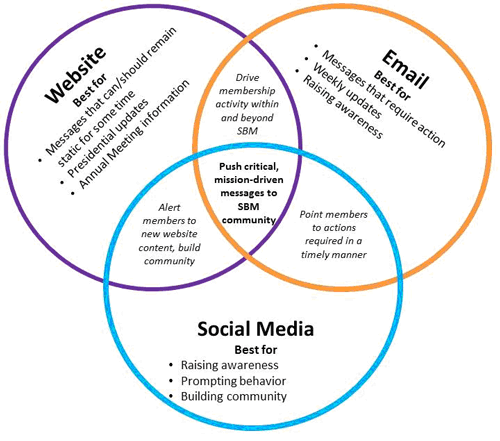
SBM Electronic Communications: Keeping in Touch with our Members
Ellen Beckjord, PhD, MPH and Alicia Sukup
Clear, relevant, and timely communication with our members is critical to the success and prosperity of SBM. Our society has always strived for excellence in how information is communicated to our members – and to the public at large – but achieving good communication is not without its challenges. In the past few years, two wonderful things have happened: first, we have seen a growing recognition of the importance of behavioral medicine in the public dialogue about health, health care, and health policy. Second, the number of channels that can be leveraged to communicate our science to our members and the public have grown.
This emphasis on our science in the public realm and the new communication channels we have at our disposal have required SBM to be more strategic than ever in our communication efforts. The figure below shows our three primary communication channels (email, website, and social media) and the best uses for each. In an effort to help our members stay informed about SBM’s communication practices, here, we detail these different channels that SBM uses on a regular basis to communicate with you, how often those channels are used, and for what purpose.
Figure: SBM’s Three Primary Communication Channels

Email Communication
Biweekly broadcast emailsare sent every other Thursday to all SBM members. These emails have the subject line SBM Updates: News, Announcements, and Deadlines, and not surprisingly, these emails are intended to communicate SBM-related information and opportunities that are likely of interest to SBM members (e.g., Annual Meeting abstract deadlines, calls for papers for the SBM journals) in a timely manner.
Once a week on Fridays, SIG digest emailsare sent with the subject line: Weekly Digest: News for SBM SIG Members to any SBMer who is a member of an SBM Special Interest Group (SIG). These once-a-week SIG digest emails replace the multiple emails that used to be sent each week by the national office to all SIG listservs. SIG digest emails typically include position announcements, behavioral medicine news and events, and information about studies and/or funding announcements. To have an item included in a SIG digest email, send it to SBM staff member Ben Stumpf (bstumpf@sbm.org).
The Outlook Newsletteris sent by email three times per year with the subject line: SBM Outlook Newsletter. Outlook is used to keep SBM members up-to-date about the activities of our Councils, Committees, and SIGs.
Finally, and particularly in the months leading up to the Annual Meeting, promotional emails that include important details about the conference are sent to SBM members. These emails include information about Annual Meeting-related deadlines; information about the meeting; and updates on the Meeting program as speakers and sessions are confirmed.
Our Website
The SBM website (https://www.sbm.org) has two components: the public-facing component (unrestricted access) and the members-only component (content only available to members with a username and password).
The public-facing component of our website presents a dynamic, timely, and comprehensive collection of information designed to be a one-stop-shop for all things important in behavioral medicine. The SBM President’s messages over the course of his or her term are featured prominently on the home page, as is activity related to the Annual Meeting, how to become a member of SBM, and newsworthy behavioral medicine events. The resources page of the public-facing website is an especially rich component of SBM’s web presence and our publications page has tables of contents for SBM’s journals (Annals of Behavioral Medicine and Translational Behavioral Medicine) as well as others.
The members-only component of our website is packed with features intended to help SBM members connect to one another in productive ways. Over the past year, we’ve made several updates to the Membership Directory and My Profile areas of the members-only section, including the ability to upload a photo of yourself, your CV, social media information (Twitter handle) and a short biography. Our hope is that these changes enhance the within-society networking that is key to promoting a sense of connectedness among members of SBM.
Social Media
SBM has a Facebook page and two Twitter feeds: one for the Society at large (@BehavioralMed) and one for the SBM President (@SBMPresident). Our Facebook page (more than 500 “likes” and counting!) is used to cross-promote important news that is communicated via our email communication and website. The @BehavioralMed Twitter feed (more than 1200 followers and counting!) also cross-promotes material communicated via other channels, serving to expose followers to relevant behavioral medicine news communicated by other societies and individuals who use Twitter. The @SBMPresident account is used to communicate timely behavioral medicine information at the discretion of the President.
We would welcome any and all feedback about SBM’s communication strategies and will continue to work to serve our members and the public with clear, consistent, and timely communication about the ever-exciting and increasingly relevant work of SBM!